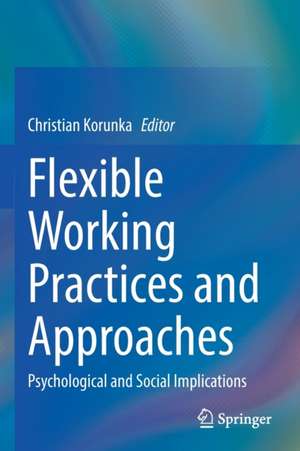Flexible Working Practices and Approaches: Psychological and Social Implications
Editat de Christian Korunkaen Limba Engleză Paperback – 27 oct 2022
Ideal for organizations implementing or considering implementing flexible work, for professionals and researchers in work and organizational psychology, and for HR professionals, this volume is an invaluable overview of rapidly changing work norms and their impact on working life.
| Toate formatele și edițiile | Preț | Express |
|---|---|---|
| Paperback (1) | 946.48 lei 6-8 săpt. | |
| Springer International Publishing – 27 oct 2022 | 946.48 lei 6-8 săpt. | |
| Hardback (1) | 951.87 lei 6-8 săpt. | |
| Springer International Publishing – 26 oct 2021 | 951.87 lei 6-8 săpt. |
Preț: 946.48 lei
Preț vechi: 1154.24 lei
-18% Nou
Puncte Express: 1420
Preț estimativ în valută:
181.12€ • 193.67$ • 151.01£
181.12€ • 193.67$ • 151.01£
Carte tipărită la comandă
Livrare economică 18 aprilie-02 mai
Preluare comenzi: 021 569.72.76
Specificații
ISBN-13: 9783030741303
ISBN-10: 3030741303
Pagini: 285
Ilustrații: XVII, 285 p. 17 illus.
Dimensiuni: 155 x 235 mm
Greutate: 0.47 kg
Ediția:1st ed. 2021
Editura: Springer International Publishing
Colecția Springer
Locul publicării:Cham, Switzerland
ISBN-10: 3030741303
Pagini: 285
Ilustrații: XVII, 285 p. 17 illus.
Dimensiuni: 155 x 235 mm
Greutate: 0.47 kg
Ediția:1st ed. 2021
Editura: Springer International Publishing
Colecția Springer
Locul publicării:Cham, Switzerland
Cuprins
1. Current forms of flexible work.- 2. The development of flexible work over the last decades and its impact on the quality of working life.- 4. Flexible work in the context of work intensification and social acceleration processes.- 5. ICT as drivers and enhancers of flexible work.- 6. Important theories explaining the impact of flexible work on working life.- 7. The paradoxes about the impact of flexible work on working life.- 8. Controlling and managing the boundaries between flexible work and private life.- 9. Social norms and dynamics associated with flexible work.- 10. Flexible work and the changing quality of recovery from work.- 11. Planning and decision-making as new job demands related to flexible work.- 12. Flexible work and the opposed psychological needs for autonomy and structure.- 13. Flexible work and the importance of job security.- 14. The special case of activity-based office concepts and its impact on working life.- 15. New forms of self-employment, crowd work and its impact on the quality of life.
Notă biografică
Christian Korunka, PhD., holds a chair for Work and Organizational Psychology at the Faculty of Psychology, University of Vienna, Austria. He has conducted many empirical studies in the areas of new forms of work, flexible work, the role of ICT at work places, and quality of working life. His studies were published in more than 90 journal articles, about 100 book chapters and he was the editor of about 10 books.
Textul de pe ultima copertă
Modern workplaces are following a strong trend of increasing flexible working practices and approaches, offering more flexibility in working times, working places, work organization, and work relations as the result of new information and communication technologies. This book brings together a group of internationally recognized experts in the field of flexible work to examine the psychological and social implications of these practices, describing the current state of research and empirically-based practices in this field. It focuses on organizational, job, and individual factors related to the quality of working life, and identifies potential risk groups where the benefits of flexible work are suppressed or not realized.
Ideal for organizations implementing or considering implementing flexible work, for professionals and researchers in work and organizational psychology, and for HR professionals, this volume is an invaluable overview of rapidly changing work norms and their impact on working life.
Ideal for organizations implementing or considering implementing flexible work, for professionals and researchers in work and organizational psychology, and for HR professionals, this volume is an invaluable overview of rapidly changing work norms and their impact on working life.
Caracteristici
Evaluates the psychological and social impacts of flexible work on the quality of working life
Describes the current research in flexible work
Provides practical strategies for organizations implementing or considering flexible work
Describes the current research in flexible work
Provides practical strategies for organizations implementing or considering flexible work
